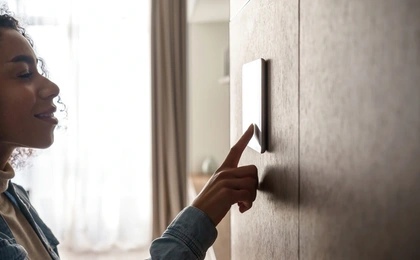Energy prices have been a big worry for lots of us in recent years. But switching to a smart home could help you bring your bills down.
There may be a small cost to get started, but smart meters and smart appliances can save you money over time. We looked at the costs and savings – and found you could save up to £375 in just two years.
Smart meters save up to £263.50 – and they’re free
According to the government’s Smart Meter Roll-Out Cost-Benefit Analysis, having a smart meter could reduce your gas use by around 2.2% and your electricity use by around 3%.
Based on typical energy prices, that could save you around £131.75 each year – or £263.50 over two years.
These savings come from using energy more efficiently. With a smart meter, you can see exactly how much you’re using – and what it’s costing you – in real time. This can make it easier to spot ways to cut back, like switching things off at the wall or using appliances at off-peak times.
Energy suppliers should install smart meters for free, and they’re available to most households. All you need to do is ask your supplier.
Save £52.02 with smart plugs
Ever leave the telly or games console on standby? You’re not alone – and it could be costing you money.
British Gas says the average home wastes up to £55 a year just from leaving appliances on standby. Smart plugs help stop that.
You plug them into your sockets and then control them using your phone. That means you can switch things off properly even when you're not at home.
A set of 4 smart plugs costs about £29.99. They usually last for years, and after two years of use, you could save around £52.02.
Switching to smart bulbs could save £60.00
LED smart bulbs use less electricity and last much longer than old-fashioned ones. You can also turn them on or off with your phone or a voice assistant – great if you forget to switch lights off!
The Energy Saving Trust says switching to LED bulbs can save the average household up to £40 a year. After buying the bulbs, you could still save about £60 over two years.
And because they last much longer than normal bulbs, you won’t need to keep buying new ones.
30 million Brits still missing out
As of September 2024, there were around 35 million smart meters installed across Great Britain, accounting for 65% of all domestic meters. This means that around 35% of households—equating to nearly 30 million people—are still using traditional meters and potentially missing out on the benefits of smart technology.
Other ways to cut your energy costs
Smart home tech isn’t the only way to lower your bills. There are lots of simple changes you can make to save energy and money:
- Turn your thermostat down by 1°C – this small change could cut your heating bill by around 10%, according to the Energy Saving Trust.
- Wash clothes at 30°C – and try to air-dry instead of using the tumble dryer.
- Close curtains or blinds at night – this helps keep the heat in and the cold out.
- Use draught excluders – seal up any gaps under doors or around windows to stop warm air escaping.
- Only boil the water you need – don’t fill the kettle for one cuppa.
- Switch off lights when you leave a room – it’s simple but easy to forget!
Support if you’re struggling with energy bills
If you’re finding it hard to keep up with your energy bills, you’re not alone – and there is help available.
Here are a few options you could explore:
📞 Contact your energy supplier – they must work with you to agree a payment plan you can afford.
💰 Ask about grants and hardship funds – many suppliers offer help if you’re struggling. You might be able to get a grant to pay off energy debt.
🏡 Check if you’re eligible for government support, like:
Speak to a free advice service, such as:
You don’t have to deal with it on your own – there are people and organisations ready to support you. If you’re struggling to pay your energy bills, speak to your supplier as soon as possible. They may be able to offer payment plans, grants or hardship support.
Fiona is a personal finance writer with over 7 years’ experience writing for a broad range of industries before joining Ocean in 2021. She uses her wealth of experience to turn the overwhelming aspects of finance into articles that are easy to understand.










